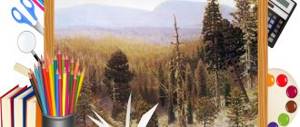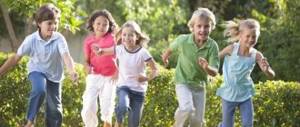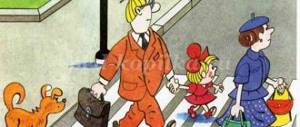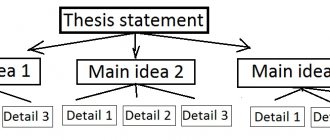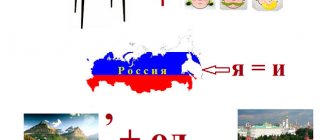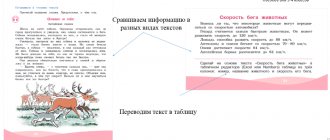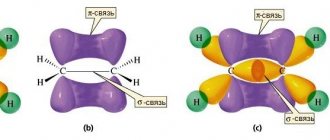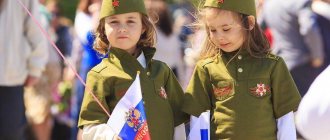This section presents topics for research papers and projects for grade 3 , which are designed to develop logical and imaginative thinking in a child, the ability to analyze acquired knowledge, draw conclusions and form their own point of view.
We have distributed the most interesting topics of research projects for 3rd grade students by subject, literary reading, the world around us, mathematics, Russian language, technology and fine arts (fine arts) at school.
In this section, students are offered project topics for the 3rd grade of elementary school, which help students develop a research position, their own opinion about the subject being studied, supported by scientific facts and their own experiences.
The presented topics of research work for the 3rd grade of primary school are interesting to students, they provide an opportunity to conduct exciting research and a more in-depth study of the chosen topic of the planned project.
The following topics for project work on literary reading in grade 3 can be modified and expanded upon request by schoolchildren or as a result of consultation with the project leader, who is usually the class teacher. The title of the research work must correspond to its content.
Project topics for 3rd grade
Sample research project topics for 3rd grade students:
Growing moss Heroes of our time Notes from the front Healthy lifestyle Hello, school! How a person masters space. What do my parents do? Computers in my house. Computers are all around us. Maslenitsa My hobby My pet Reward in our house Our house. Our yard Our planet in space New Year's beauty About my name Useful thing for the home Why the puddle dried up Why the plane flies. Holidays of my family My dream profession Birds are our friends Russian airplanes Family heirlooms Bread is the center of everything School is the second home! I grow flowers from Atelier “Thumbelina”. The atom is a helper and a destroyer. War and our family Growing mold Where does the book live? Family tree of our family Cactus - a prickly friend When did the car appear? Russian cosmonauts. Moon City. My hometown Our underwater friends Why it rains Rules of conduct for a gentleman The fastest cars. Family traditions Symbols of our class Symbols of our school The secret of the chocolate bar The fuel of the future. Man in the underwater world. What to do with garbage. What did the animals tell the inventor? Etiquette for a Young Lady I am an inventor. I choose sports.
Project topics in Mathematics for 3rd grade
Geometric figures around us Units of measurement in Ancient Rus' Units of measurement in other countries Measuring quantities A book about mathematics in the Ancient world A collection of homemade measuring instruments. Mathematics in cooking Mathematics in trade Mathematics in the Ancient world Mathematics in construction Mathematical tales Transmission of secret meaning in books. Conveying secret meaning in paintings. Applying addition and subtraction skills in our lives. Encryption devices. Professions that require good mathematical training. Methods for encrypting texts. Location encryption. Numbers in proverbs and sayings.
Reading Project Topics for 3rd Grade
Sample research project topics for 3rd grade reading:
And in the old days they said this (searching in dictionaries for outdated names of objects that we continue to use). Epic fables about the hero Quiz based on the works of your favorite writers. Seasons in the poem Seasons in oral folk art. Heroes of fairy tales in sculpting Heroes of fairy tales in drawings Heroic epic of the peoples of my region. Dramatization of the best fragments of books Genres of oral folk art My favorite book The image of the Motherland in the paintings of artists. The image of the Motherland in the works of composers. The image of the Motherland in the works of prose writers and poets. Autumn in poems Features of literary fairy tales Features of folk tales Preparation for the parade of living heroes Poetry Festival Russian writers Collection of poems on military topics. Creating a collection of epics Creating a collection of favorite works Creating a collection of proverbs and sayings. Composing your own works of small genres of oral folk art. Poems about spring Counting books and fables Outdated words in A. Pushkin's fairy tales Brow and mouth - Old Russian words-designations. I am a young author
Project topics in the Russian language for grade 3
Borrowing words from other languages. Why is a comma needed? Adjectives in riddles. Proper names Names, surnames, patronymics in different languages of the world. Artificial and dead languages History of verbs History of nouns How the alphabet appeared What dictionaries are there What is the future of the book? Pronouns in riddles, proverbs and sayings. Pronouns in small genres of oral folk art. The world of phraseological units. Nonverbal language About unfamiliar words Generalization of knowledge about a noun. Peculiarities of writing vowels “a” and “u” after sibilant consonants. Cases in our life Worker prefixes A story about a word The role of the subject and predicate in a sentence. We build words and sentences A fabulous journey into the composition of the word Word. Phrase. Offer. Composition of the word.
Project topics on the world around us for grade 3
Current topics of research projects on the surrounding world:
“Old and small” in the culture of the peoples of my region. My fellow countrymen in the history and culture of Russia. Family travel Whose name is my street named after? Great people of Russia and the best traits of national character. The influence of human activities on the ecosystems of our area The influence of environmental factors on the growth and development of plants Mushrooms of our area Wild plants of our region Domestic animals around us Pollution of local ecosystems Green windowsill Winter work and holidays in the traditions of the peoples of my region. Winter outdoor games Changes in body temperature during the day. Changes in heart rate during the day. Names of the native land History March 8 History in the names of cities of the world History in the names of rivers, seas, oceans Summer work and holidays in the traditions of the peoples of my region. Local ecosystem (forest, pond, meadow) Local insect species Local bird species Minerals and rocks of their area The world of our hobbies The museum of my fellow countryman. About sports and healthy eating What the trees whisper about The lifestyle and behavior of birds (using the example of a certain species). Autumn work and holidays in the traditions of the peoples of my region. Monuments of the city Monuments of the capital of Russia Monuments of the capital of the country Behavior of domestic animals (using specific examples) Weather of your region Why a river (lakes, city, village, village) is called that way. Rules of behavior in the ecosystem Natural materials of my region and local arts and crafts. Human environmental activities in their region The past in the names of Russian cities Diversity and behavior of fish (using the example of an aquarium) Plants of our region in the Red Book Rational nutrition of a junior schoolchild Rare and endangered species of plants and animals in their region. Daily routine of a primary school student The role of the master and hostess in a traditional family. With grandma in the kitchen The connection between the state of nature and human health. Seasonal changes in nature Sun, Moon and starry sky in different seasons of the year Toponymy of my region and folk interpretations of toponyms. The streets of our city. Economic activities of people in their region. Ecological connections in nature. Young driver: traffic rules.
Essay on the topic “Russian Empire” and the world around us, grade 3
Abstract for the lesson “Russian Empire”, the world around us, grade 3.
Compiled by: Terekhova T.V., teacher of the Municipal Educational Institution “Davydovskaya Secondary School”
In the 17th century, our state began to be called the Russian Empire. From Latin the word “empire” is translated as “power”. At the head of the Russian Empire was the emperor (tsar) - the sole ruler (sovereign).
Now an academician, now a hero,
sometimes a sailor, sometimes a carpenter.
He is an all-encompassing soul
the eternal worker was on the throne.
A.S. Pushkin
Peter I
The first Emperor of Russia was Peter I. He was not prepared to be the heir to the Russian throne, so he did not receive a good “royal education.” He became king at the age of 10, and at 17 he began to rule independently.
Tsar Peter was very tall and handsome. In addition, he was distinguished by great mental alertness, a thirst for knowledge and high efficiency. All his life he studied himself and taught his subjects.
P
The reforms he carried out in the country concerned various aspects of its life. These were military reforms, changes in everyday life, achievements in culture, science, and in the activities of government institutions.
The great service of the emperor to the state was the creation of the Russian fleet.
The history of Voronezh and the Voronezh region is closely connected with the name and activities of Peter I. Peter I first visited Voronezh in February 1696, the last time in December 1722. Peter I visited here several times, sometimes living for several months. One of the first constructions of ships began in the Voronezh region, and therefore it is still called the “cradle of the Russian fleet.”
The Great Tsar managed to create a strong navy and win victories in the Baltic and Azov Seas.
To strengthen himself near the Baltic Sea, at the mouth of the Neva, Peter I decided to build a fortified city here. The city was named St. Petersburg. It was the capital of Russia for two centuries. St. Petersburg, a city-museum, is considered one of the most beautiful cities in the world.
... I saw a wonderful vision: a woman came down from the clouds, came down and found herself as a priestess or a goddess before me. White clothes flowed on her like a silver wave... hand outstretched on the altar , on the sacrificial heat, Burning fragrant poppies, She served the deity on high. The huge midnight eagle, Companion of lightning to triumph, Heroic herald of glory, Sitting before her on a pile of books, Brewed sacred her statutes: The extinct thunder in his claws And the laurel with olive branches He held, as if asleep...
A Derzhavin
Catherine II the Great
Before Catherine II, the Russian Empire was ruled by many sovereigns, and each of them made their own contribution to the development of the Russian state. But only Catherine II, like Peter I, was called the Great, because she did a lot for Russia.
The period of Catherine’s reign is closely connected with the history of our village. After all, it was at this time that settlers from the Davidov Desert founded Davydovka - in 1763. The history of the village speaks about this, and quite recently, at the beginning of our village, a roadside stele was built with the date of the establishment of Davydovka.
Catherine the Great loved to show the people her care and generosity. But her words did not always coincide with deeds. First of all, as an empress, she took care of rich people.
Catherine reigned for 34 years. All this time was filled with resounding victories of the Russians and wise orders of the empress. During her reign, Russia gained access to the Black Sea. The port city of Sevastopol began to be built in Crimea. Under Catherine II, medical care was organized for the first time for the common people, and vaccinations began to be given against such a terrible disease as smallpox.
For her many merits, history gave her the name Great; a monument was erected in her honor in St. Petersburg. In Russia, Catherine II, not without reason, was considered the most Russian empress and was lovingly called “the German mother of the Russian Fatherland.”
C
Arsky Russia - meekness and humility, Centennial icons have fervent prayers, Thirst for repentance, the sweetness of forgiveness, Sacrificial valor of selfless battle...
Nicholas II
During the reign of Nicholas II, significant changes occurred in the country.
His reign saw wars and revolutions. The Russian people associated all their troubles and misfortunes with his name.
In 1914, a terrible war began - the First World War .
It continued until 1918. The war has engulfed most countries on the planet, including Russia. Countries sought to take land from each other. Every day the war made people's lives unbearable.
At the end of the World War, in February 1917, a revolution began in Russia.
This is an event that dramatically and completely changed the life of the country and the course of its history.
Nicholas II was a gentle, gentle man; he did not have the strength and will to rule such a huge country in turbulent times.
On March 2, 1917, the Tsar abdicated the throne. He was the last Russian emperor. From that moment on, Russia ceased to be an empire.
7
